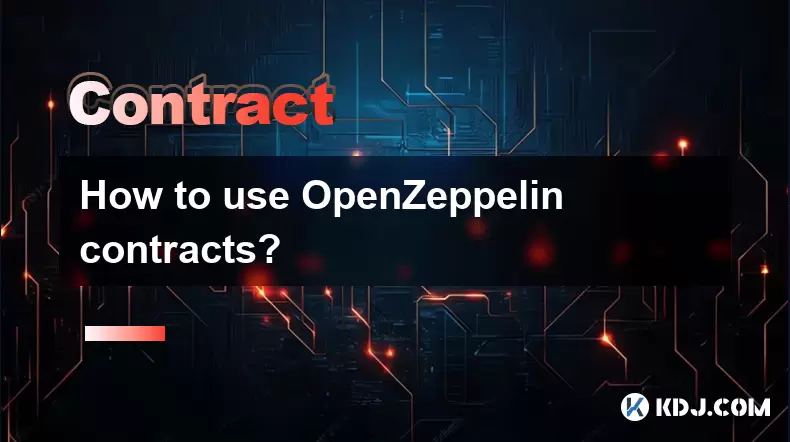-
 bitcoin
bitcoin $87959.907984 USD
1.34% -
 ethereum
ethereum $2920.497338 USD
3.04% -
 tether
tether $0.999775 USD
0.00% -
 xrp
xrp $2.237324 USD
8.12% -
 bnb
bnb $860.243768 USD
0.90% -
 solana
solana $138.089498 USD
5.43% -
 usd-coin
usd-coin $0.999807 USD
0.01% -
 tron
tron $0.272801 USD
-1.53% -
 dogecoin
dogecoin $0.150904 USD
2.96% -
 cardano
cardano $0.421635 USD
1.97% -
 hyperliquid
hyperliquid $32.152445 USD
2.23% -
 bitcoin-cash
bitcoin-cash $533.301069 USD
-1.94% -
 chainlink
chainlink $12.953417 USD
2.68% -
 unus-sed-leo
unus-sed-leo $9.535951 USD
0.73% -
 zcash
zcash $521.483386 USD
-2.87%
How to use OpenZeppelin contracts?
OpenZeppelin Contracts provides secure, reusable smart contracts for Ethereum, enabling developers to build tokens and dApps efficiently with standards like ERC-20 and ERC-721.
Jul 21, 2025 at 05:35 am

Understanding OpenZeppelin Contracts
OpenZeppelin Contracts is a library of reusable and secure smart contracts for Ethereum and other blockchain platforms that support Solidity. These contracts are widely used in the development of decentralized applications (dApps) and token systems. The library provides implementations of standards like ERC-20, ERC-721, and ERC-1155, along with security-related utilities such as Ownable, Pausable, and SafeMath. Developers use OpenZeppelin to avoid reinventing the wheel and to ensure that their smart contracts are built on a foundation that has been audited and tested extensively.
Before diving into implementation, it is crucial to understand how the contracts are structured and how to import them into your project. The contracts are modular, meaning you can import only what you need. This modularity helps reduce gas costs and improves maintainability.
Setting Up Your Development Environment
To use OpenZeppelin Contracts, you must first set up a development environment. Begin by installing Node.js and npm, which are essential for managing JavaScript packages. Once installed, initialize a new project using:
npm init -yNext, install Truffle, a popular Ethereum development framework, or Hardhat, another widely used tool:
npm install -g truffle
or
npm install --save-dev hardhat
After setting up the framework, install OpenZeppelin Contracts via npm:
npm install @openzeppelin/contractsThis command installs the OpenZeppelin library into your project’s node_modules directory. You can now import individual contracts or utility functions directly into your Solidity files.
Importing and Extending OpenZeppelin Contracts
Once installed, you can begin importing OpenZeppelin contracts into your Solidity files. For example, if you are building an ERC-20 token, you can import the ERC20.sol contract:
pragma solidity ^0.8.0;
import '@openzeppelin/contracts/token/ERC20/ERC20.sol';
contract MyToken is ERC20 {
constructor(uint256 initialSupply) ERC20('MyToken', 'MTK') {
_mint(msg.sender, initialSupply);
}
}
This code creates a new token that extends the ERC20 contract from OpenZeppelin. The constructor takes an initial supply and assigns it to the deployer’s address using the _mint function. This is a secure and tested way to create tokens without writing boilerplate code.
If you need additional features, such as pausability or ownership controls, you can import and extend other contracts:
import '@openzeppelin/contracts/access/Ownable.sol';import '@openzeppelin/contracts/security/Pausable.sol';
contract MyPausableToken is ERC20, Ownable, Pausable {
constructor(uint256 initialSupply) ERC20('MyToken', 'MTK') {
_mint(msg.sender, initialSupply);
}
function pause() public onlyOwner {
_pause();
}
function unpause() public onlyOwner {
_unpause();
}
}
This approach allows you to compose your contracts with secure and battle-tested components.
Deploying Contracts with OpenZeppelin
Once your contract is written, the next step is deployment. If you're using Truffle, create a migration file in the migrations/ directory:
const MyPausableToken = artifacts.require('MyPausableToken');
module.exports = function (deployer) { deployer.deploy(MyPausableToken, 1000000);};
This script deploys the contract with an initial supply of 1,000,000 tokens. Run the migration using:
truffle migrate --network If you're using Hardhat, create a deployment script in the scripts/ folder:
async function main() { const MyPausableToken = await ethers.getContractFactory('MyPausableToken'); const myToken = await MyPausableToken.deploy(1000000); await myToken.deployed();
console.log('MyPausableToken deployed to:', myToken.address);}
main().catch((error) => { console.error(error); process.exitCode = 1;});
Then deploy using:
npx hardhat run scripts/deploy.js --network Make sure you have a funded Ethereum account and the correct network configuration in your truffle-config.js or hardhat.config.js file.
Interacting with Deployed Contracts
After deployment, you can interact with your contract using tools like Remix IDE, MetaMask, or ethers.js. If you're using ethers.js, connect to your contract as follows:
const { ethers } = require('ethers');
const provider = new ethers.providers.JsonRpcProvider('https://mainnet.infura.io/v3/YOUR_INFURA_PROJECT_ID');const signer = new ethers.Wallet('YOUR_PRIVATE_KEY', provider);const contractAddress = 'YOUR_CONTRACT_ADDRESS';const abi = require('./MyPausableToken.json').abi;
const contract = new ethers.Contract(contractAddress, abi, signer);
async function pauseContract() { const tx = await contract.pause(); await tx.wait(); console.log('Contract paused');}
Ensure that the signer has sufficient funds to pay for gas. You can also interact with the contract using web3.js or through blockchain explorers like Etherscan.
Frequently Asked Questions
Q: Can I modify OpenZeppelin contracts directly?A: While you can technically modify the contracts, it is not recommended. Instead, you should extend the contracts and override functions if needed. Modifying the original contracts may introduce security vulnerabilities or break compatibility with future updates.
Q: How do I upgrade a contract built with OpenZeppelin?A: OpenZeppelin provides the Upgrades Plugins for Truffle and Hardhat to deploy and manage upgradeable contracts. These tools allow you to proxy contracts and update their logic without losing state.
Q: Are OpenZeppelin Contracts compatible with Solidity versions higher than 0.8.x?A: Yes, OpenZeppelin Contracts are actively maintained and support Solidity 0.8.x and above. However, always check the version compatibility in the official documentation or on npm before importing.
Q: Is it safe to use OpenZeppelin Contracts in production?A: Yes, OpenZeppelin Contracts are widely used in production environments and have been audited by multiple third parties. However, always perform your own audits and testing before deploying to mainnet.
Disclaimer:info@kdj.com
The information provided is not trading advice. kdj.com does not assume any responsibility for any investments made based on the information provided in this article. Cryptocurrencies are highly volatile and it is highly recommended that you invest with caution after thorough research!
If you believe that the content used on this website infringes your copyright, please contact us immediately (info@kdj.com) and we will delete it promptly.
- Bitcoin Drops Amidst Analyst Warnings and Shifting Market Sentiment
- 2026-02-05 09:40:02
- Georgia Brothers Sentenced to 20 Years for Elaborate COAM Gambling Fraud Scheme
- 2026-02-05 09:45:01
- MicroStrategy Stock Loss: Pension Funds Face 60% Plunge Amidst Crypto Volatility
- 2026-02-05 10:55:01
- Super Bowl LX: Teddy Swims, Green Day, and a Legacy Toss Set for 2026 Extravaganza
- 2026-02-05 07:20:02
- Fantasy Football Premier League Round 25: Key Player Picks, Tips, and Advice for Optimal Team Performance
- 2026-02-05 07:15:02
- Remittix Launches PayFi Platform with a Generous 300% Bonus Offer, Driving Investor Excitement
- 2026-02-05 07:05:01
Related knowledge

How to Manage Emotions and "Revenge Trading" in Futures?
Feb 05,2026 at 12:19am
Understanding Emotional Triggers in Futures Markets1. Market volatility directly impacts psychological states, often amplifying fear or euphoria based...

How to Analyze Market Sentiment Using the Fear and Greed Index?
Feb 05,2026 at 07:40am
Understanding the Fear and Greed Index1. The Fear and Greed Index is a composite metric designed to quantify prevailing emotional states among cryptoc...

How to Use Volume Profile to Find Key Futures Entry Levels?
Feb 04,2026 at 11:39pm
Understanding Volume Profile Structure1. Volume Profile displays the distribution of traded volume at specific price levels over a defined time period...

How to Trade Bitcoin Futures with 100x Leverage? (High-Risk Setup)
Feb 05,2026 at 11:00am
Understanding Bitcoin Futures Mechanics1. Bitcoin futures contracts represent agreements to buy or sell BTC at a predetermined price and date in the f...

How to Maximize Capital Efficiency Using Cross Margin Trading?
Feb 05,2026 at 12:40am
Cross Margin Trading Fundamentals1. Cross margin trading allows traders to use their entire account balance as collateral for open positions across mu...

How to Trade Crypto Contracts During Major News Events? (CPI/FOMC)
Feb 05,2026 at 09:59am
Understanding Market Sensitivity to Macro Data Releases1. Cryptocurrency futures markets exhibit pronounced volatility during U.S. CPI and FOMC announ...

How to Manage Emotions and "Revenge Trading" in Futures?
Feb 05,2026 at 12:19am
Understanding Emotional Triggers in Futures Markets1. Market volatility directly impacts psychological states, often amplifying fear or euphoria based...

How to Analyze Market Sentiment Using the Fear and Greed Index?
Feb 05,2026 at 07:40am
Understanding the Fear and Greed Index1. The Fear and Greed Index is a composite metric designed to quantify prevailing emotional states among cryptoc...

How to Use Volume Profile to Find Key Futures Entry Levels?
Feb 04,2026 at 11:39pm
Understanding Volume Profile Structure1. Volume Profile displays the distribution of traded volume at specific price levels over a defined time period...

How to Trade Bitcoin Futures with 100x Leverage? (High-Risk Setup)
Feb 05,2026 at 11:00am
Understanding Bitcoin Futures Mechanics1. Bitcoin futures contracts represent agreements to buy or sell BTC at a predetermined price and date in the f...

How to Maximize Capital Efficiency Using Cross Margin Trading?
Feb 05,2026 at 12:40am
Cross Margin Trading Fundamentals1. Cross margin trading allows traders to use their entire account balance as collateral for open positions across mu...

How to Trade Crypto Contracts During Major News Events? (CPI/FOMC)
Feb 05,2026 at 09:59am
Understanding Market Sensitivity to Macro Data Releases1. Cryptocurrency futures markets exhibit pronounced volatility during U.S. CPI and FOMC announ...
See all articles










































































